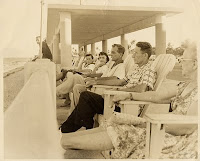Interview techniques
Do you like job interviews? I tell you, I love them. In my work I conduct periodic interviews – what a wonderful opportunity to dig into an individual’s skills, philosophy and experience. And there is also the sobering heart-knowledge that many are seeking employment these days.
A few tips I’ve picked up – would you like to hear them? Would love for you to share your recommendations with the bgurung blog community as well.
* Roleplay. There must be someone you trust – ask them to practice-interview you. Be prepared. Bring your A-game.
* Don’t arrive on time. Really. Arrive early (but not too early), and wait patiently.
* Stay on message. Ensure that you convey your key message throughout all your answers and statements. And to spell this out: make sure you have a key message.
* Have clear examples that illustrate your skills and experience. You may be brilliant, but you can’t simply say so. Just like the great writers’ advice: show, don’t tell.
* Connect with the interviewer. Don’t be superficial, of course, but know that it can either help or do nothing. Either way, you’re fine.
* Keep a clear head. Having a bad day? Lost your confidence? Distracted? Put all that aside, and focus on the task at hand: a successful interview.
* Do your research. You probably don’t need to know everything about the position and the organization, but you should know enough.
* Up the ante. Pitch something, bring a proposal, present a portfolio. I’m astounded how often – especially in this cyber, distracted, well-marketed society – interviewees come prepared to only talk. Talk isn’t enough. Individuals accept information and learn in different ways – visual, kinesthetic, auditory, and such. Incorporate different learning styles into your interview style.
* Optional: Pending the work you do and who you are, you may wish to manage the interview yourself. As Seth Godin so poignantly shared: Make it the You Show. The cautionary piece is that managing an interview yourself might be detrimental – you might come off domineering. You’ll have to assess and make that call.
In all this, it’s your responsibility to give a good interview. You’re the one who should care the most about your future. … But you knew I was going to say that.
A few tips I’ve picked up – would you like to hear them? Would love for you to share your recommendations with the bgurung blog community as well.
* Roleplay. There must be someone you trust – ask them to practice-interview you. Be prepared. Bring your A-game.
* Don’t arrive on time. Really. Arrive early (but not too early), and wait patiently.
* Stay on message. Ensure that you convey your key message throughout all your answers and statements. And to spell this out: make sure you have a key message.
* Have clear examples that illustrate your skills and experience. You may be brilliant, but you can’t simply say so. Just like the great writers’ advice: show, don’t tell.
* Connect with the interviewer. Don’t be superficial, of course, but know that it can either help or do nothing. Either way, you’re fine.
* Keep a clear head. Having a bad day? Lost your confidence? Distracted? Put all that aside, and focus on the task at hand: a successful interview.
* Do your research. You probably don’t need to know everything about the position and the organization, but you should know enough.
* Up the ante. Pitch something, bring a proposal, present a portfolio. I’m astounded how often – especially in this cyber, distracted, well-marketed society – interviewees come prepared to only talk. Talk isn’t enough. Individuals accept information and learn in different ways – visual, kinesthetic, auditory, and such. Incorporate different learning styles into your interview style.
* Optional: Pending the work you do and who you are, you may wish to manage the interview yourself. As Seth Godin so poignantly shared: Make it the You Show. The cautionary piece is that managing an interview yourself might be detrimental – you might come off domineering. You’ll have to assess and make that call.
In all this, it’s your responsibility to give a good interview. You’re the one who should care the most about your future. … But you knew I was going to say that.


Another source of interview tips:
ReplyDeletehttp://seattlepi.nwsource.com/business/401000_workcoach23.html
One thing I have heard is that, besides the obvious need for cleanliness and good grooming, is to not smell. At all. That means not to smell good, i.e. with perfume, aftershave or cologne, as some people have sensitivities to these or you might not wear a scent they like. What do you think?
Excellent point, Chris. Sometimes what seems a good idea may backfire.
ReplyDeleteFor example, many doctors' offices ask that you don't wear perfume / cologne.